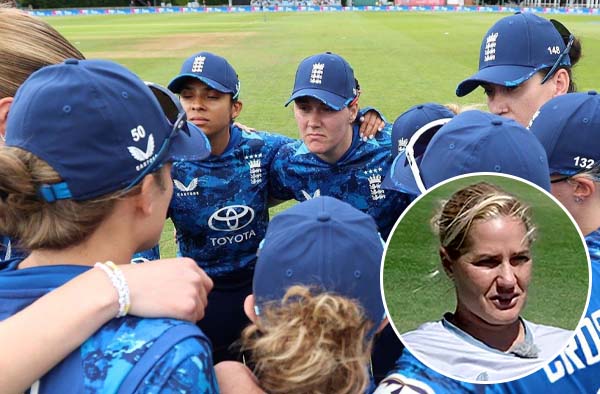In the third and final ODI at Chester-le-Street on July 22, England fell short by 13 runs after India posted a formidable total of 318 for 5, powered by captain Harmanpreet Kaur’s brilliant century. England stumbled early, losing two wickets for just 8 runs, but a timely recovery didn’t prove enough for the win, as Kranti Goud delivered a devastating six-wicket haul that ultimately bowled England out for 305 with just one ball remaining.

England women’s cricket team has come under scrutiny after a 2-1 ODI series defeat to India, with former fast bowler Katherine Sciver-Brunt, wife of England captain Nat Sciver-Brunt, publicly questioning the team’s attitude, discipline, and fight.
Katherine, speaking on BBC Test Match Special, expressed frustration over what she perceived as a lack of intensity among some players, describing parts of the team’s attitude as “lazy” and showing “no discipline.”
She said, “It’s hard for me to understand some people sometimes, and their attitudes, because to me it looks lazy and like they don’t care. Are they actually feeling like that? Or do you actually care a lot and that is your way of showing it? I struggled a lot with that.” She also noted, “It came across to me as bad attitude and no discipline. That is definitely not what I’m seeing from everyone but at times there are examples.”
Katherine elaborated on the mental challenge facing the team, suggesting that pressure causes some players to become “crippled inside,” lose focus, and avoid taking responsibility. She reflected on the changes in the team composition over time: “A lot of versions like me have left the team, and a lot of different versions have come into the team. Nat is captain now and she’s the polar opposite to me, she’s very quiet, inside and patient. She is everything I am not. You know how I feel but you wouldn’t know how Nat is feeling.”
Despite the criticism, she recognized that the desire to do well remains present, but there is a shortage of players willing to take a bold and front-footed approach. Katherine concluded, “I don’t think everyone is doing everything they possibly can. And the key to that question is why? I don’t think there is anything malicious in that, it is a mental thing. We just need to be stronger internally and be more outwards with our fight.”
In response, England captain Nat Sciver-Brunt, who top-scored with 98 off 105 balls in the series decider, defended her team and their commitment. Addressing the criticism in her post-match press conference, she offered insight into the team’s demeanor, acknowledging that calmness on the outside can be misleading: “I’ve actually been put in that situation before when I was a lot younger – ‘she’s so relaxed, she doesn’t look like she’s that interested’ – but on the inside that’s not what’s true.”
Nat affirmed, “I guess from the outside people might look in certain ways, but you never know what’s going on inside. I know everyone on that pitch is committed to doing the best they can for England.”
England women’s head coach Charlotte Edwards also expressed strong support for the team’s attitude and professionalism, stating, “I couldn’t be happier with where the squads at the moment, in terms of their attitude and effort and professionalism they’ve shown. That was something that I made very clear when I came into this role and I couldn’t be happier.”
The debate around England women’s team attitude comes amid ongoing challenges around fielding and mental resilience. The team has struggled with scrappy fielding performances, which were a factor in their exit from the T20 World Cup last year and continued to be a concern in the recent series.
At one point in the final ODI against India, only Sophie Ecclestone’s economical bowling stood out, as other bowlers conceded runs freely. Despite the pressure, a notable partnership between Nat Sciver-Brunt and Emma Lamb (162 runs) helped avoid a heavier defeat chasing a world-record target.
This scrutiny extends beyond performance, highlighted by a recent disagreement involving Ecclestone and former England player-turned-broadcaster Alex Hartley, revealing tensions off-field as well. England’s managing director Clare Connor emphasized that media scrutiny is part of the professional game now, saying players must embrace it as the sport advances.
With the 2025 ODI World Cup scheduled to start in India and Sri Lanka in 10 weeks, England’s women’s team faces increased pressure to demonstrate both their skills and their mental toughness on the world stage.
This exchange between Katherine and Nat Sciver-Brunt captures the dual perspectives—criticism from a former player with high expectations and a current captain’s steadfast defense of team commitment, underscoring the complex dynamics at play as the squad prepares for upcoming challenges.
